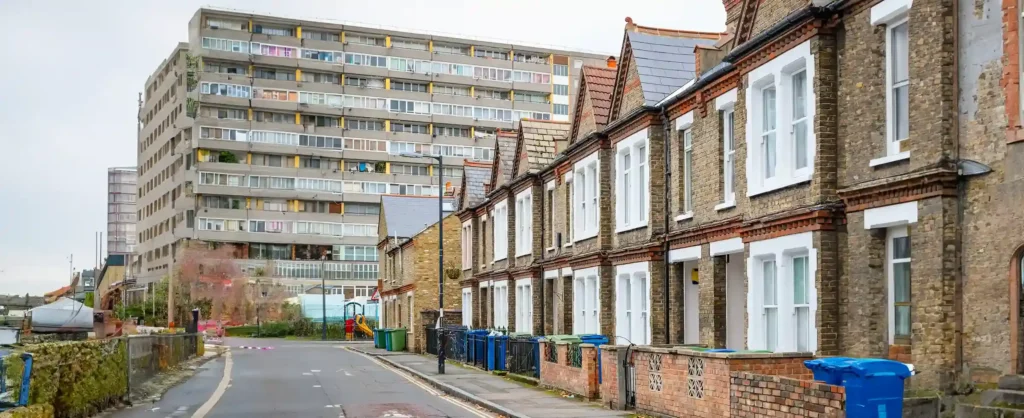England is used to international investors hoping to break into its property market, especially when it comes to London. For the super-rich, the nation’s capital has become synonymous with property investment, with 70-85% of overseas property purchases made for investment or rental purposes, according to government statistics. Whereas England’s rich history of foreign investment has allowed for speedy progress on stalled property development sites and spurred the growth of its build-to-rent sector in the past, mounting concerns over housing affordability have put international investors in a different light.
According to a 2017 study from the Centre for Economic Policy Research (CEPR), average house prices in England and Wales would be approximately 19% lower without foreign investment capital. As the housing and cost of living crises worsen, investors could face heavy regulation to keep them from dominating the UK housing market and pricing UK citizens out of homeownership.
Are you a current or prospective international investor interested in finding out which way the UK housing market could turn? This week’s blog will give you insight into your property investment options, courtesy of Concept Capital Group.
The Curious Case of Canada
Though England remains relatively open to foreign investment, other countries are tackling the difficult question of whether indulging international interests in property investment has negatively impacted homeland house seekers by weakening housing affordability. Canada may be the most notable example among them.
Entering 2023 with an average house price of $757,600, more than 151% of the median income of its populace, Canada is infamous for having one of the most unaffordable housing markets in the world. To help ease this financial pressure, the country placed a temporary two-year ban on foreign property purchases. This ban has completely locked international investors out of the Canadian property market, imposing hefty fines on those who disobey.
One year later, the length of Canada’s ban on foreign investors extended from its January 1st, 2025 end date to a January 1st, 2027 end date as part of its plan to stimulate its economy while providing affordable housing to its citizens. Despite criticisms ranging from the ban not being restrictive enough on international investment to an insistence that it does not address the root cause of the housing crisis, the potential housing market rebound represented by a growth in house sales and new builds appears to be all the Canadian government needs to double down on its controversial new regulation.
This is not the first time a country with unsustainable housing affordability problems resorted to bans on international investment to see an improvement. In 2018, New Zealand addressed its similarly skewed housing market by banning certain non-residential foreigners from purchasing homes.
With England already introducing new regulations to restrict the purchase and usage of short-term holiday lets and address its housing affordability crisis, could the UK soon introduce a widespread ban on foreign investors of its own?
Why the UK May Restrict International Property Investors
While the UK has yet to make any significant moves towards controlling the flow of international property investment, concerns about the influence foreign investors exert on the country’s housing market are hardly foreign in their own right.
JLL research shows that 53% of investment volumes in the first half of 2023 were from international investors. Further research by estate agents, Benham and Reeves, reveals that, among the top 50 most represented nations in the English and Welsh housing markets, only three have experienced a decline in ownership proportions in the past year.
Were that not enough, a 2022 article from The Guardian suggests that over 138,000 residential and commercial properties in England and Wales are owned by offshore companies, with holdings in London alone worth a combined $55bn. Despite the numerous financial setbacks of 2023, international investors are locked into the housing market and seemingly unwilling to budge.
But to what extent do international investors need to fear an upcoming crackdown on their ability to invest in one of the most popular markets in the world? Significant change could be more likely than many would expect.
Sadiq Khan: Hard on Foreign Investors?
In September 2016, the Mayor of London, Sadiq Khan, launched an inquiry into the impact of foreign investment on London’s housing market. The Greater London Authority (GLA) partnered with the University of York and the London School of Economics (LSE) to investigate, revealing that the proportion of new-build properties sold to international investors rose from 10.5% in 2014 to 17.9% in 2016. For the prime, “high-end” side of London’s housing market, international investors accounted for 36% of all home sales in the same period. LSE’s part of the inquiry even concluded that foreign investment reduced homeownership rates among UK residents, pricing them out of the market and forcing them to rent.
Later, in 2022, Sadiq Khan urged ministers in Parliament to draft a register of UK properties owned by international investors to fight money laundering and corruption within London’s property market. His findings not only indicate that almost 250,000 properties in England and Wales are registered to foreign buyers, but that many of these properties are left empty for large parts of the year. With the increased scrutiny on foreign property investment that this investigation invites, it may not be long before international investors and housing affordability come under fire.
Investing From Abroad with Concept Capital Group
While we can only speculate and forecast the direction of the traditional UK property market, Concept Capital Group offers international investors an innovative route into ownership of UK property through modular social housing.
With Concept Capital Group, you can invest at a lower price point with the added reliability of a fully insured, non-depreciating asset that exists outside of the ever-shifting social and political landscape of traditional homes. That means no hidden fees, no nasty surprises and no hassle for our clients. Plus, our 360-degree management services allow you to invest and collect your monthly rental income from anywhere in the world while we handle the day-to-day.
Ready to join the future of international property investment? You can book a call with our team today.













